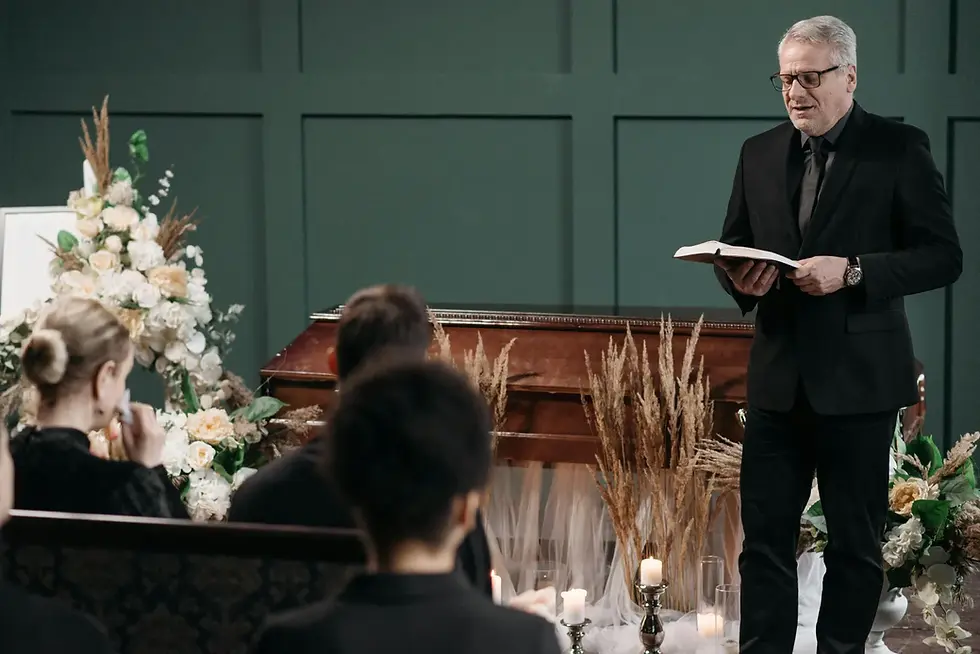How to talk to family about end of life plans
- Feb 2, 2023
- 3 min read
Updated: Mar 23, 2023
Whilst family might be the ones that know you best, it’s not ideal to put end of life planning entirely in their hands. Many will choose to get their affairs in order so that stress can be alleviated from loved ones, especially considering the emotional impact of losing a relative. When discussing end of life planning, it is important to iron out concerns surrounding the conditions of your end of life care, as well as more practical considerations pertaining to property and the will.

Why is it important to discuss end of life planning?
It is far easier to avoid discussing the subject altogether in want of not upsetting family members, or perhaps you might not know what kind of options are out there. However, even if you don’t have money to leave behind, having a conversation about end of life planning is important for many reasons:
It can avoid stress if otherwise left to family members to agree upon following a loved one's death
Documenting your wishes can provide relief
You won’t have to worry about family getting things wrong
You’ll feel more in control of your future
How to approach the subject of end of life planning
Before you broach the subject of either your end of life plans or a relatives, it might be wise to choose an environment conducive to an open, personal conversation. Perhaps in your home, or somewhere quiet where you’re unlikely to be disturbed. You might also want to mention the subject in advance so that it will come as less of a shock.

If you think that family members are likely to shut down the conversation, especially if you begin with a blunt opener, you can approach the topic by bringing up an example, for instance, of someone you know, or something that appeared in a TV show or on the news. This could soften the intensity of what’s to come for your loved ones who naturally might feel overwhelmed having this conversation. You might find that reframing the subject in this light makes it easier for people to open up.
Rather than having a very long conversation that might be difficult for family members, perhaps you could have a series of short conversations to cover end of life planning.
What to consider when making end of life plans?
In the future, you might become unable to explain what you want to happen following your death or you might not be able to make decisions of this nature for yourself.
We have another article explaining what to do when someone dies that covers who to speak to following a loves one's death, when to organise a funeral, matters relating to power of attorney, as well as registering a death. However, it’s important to have plans in place that respect your wishes before it’s too late.
It’s worth thinking about what you want concerning the following:
What is important to you in the final days of life?
What are your wishes concerning medical treatment? There might be some treatments you’d like to avoid/opt out of
Do you have any beliefs that affect end of life care?
Are there specific foods you’d like to eat, or clothes you’d like to wear?
Would you rather live in a hospice or in your own home and have extra help if things get difficult?
Have you written a will yet?
If have any pets, who will look after them?

How can I record my wishes?
In England and Wales there are three main ways to record your end of life planning:
An advance decision, or ‘Living Will’. This is a document that specifies various treatments you do not want to receive in certain circumstances. The legal name is an Advance Decision to Refuse Treatment.
An advance statement - a written statement concerning your future care spanning personal preferences as well as medical considerations.
A lasting power of attorney for health and welfare - giving someone you trust the power to advocate for your end of life wishes
If you don’t have close family to speak to record your wishes, notify your doctor of your end of life plans. A doctor can also help you understand your treatment options and support you with end of life decisions. It is vital to record these things - 84% of people have strong opinions about their own end of life care, yet only 4% have recorded this in a legally binding document.
There are many organisations out there to assist you with end of life planning, such as Cinnamon Trust, Age UK, and Dying Matters, as well as information on the NHS website.
If you're looking for a more personal way to be memorialised, you can now register to have your ashes scattered in space once you pass away. Available from just £75, registration includes a comprehensive memorial planning pack which gives you everything you need to set your plans in order emotionally, financially and legally.




